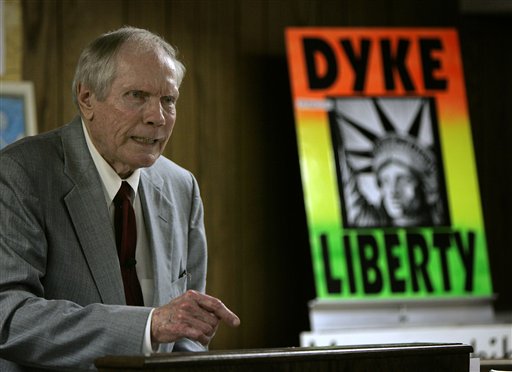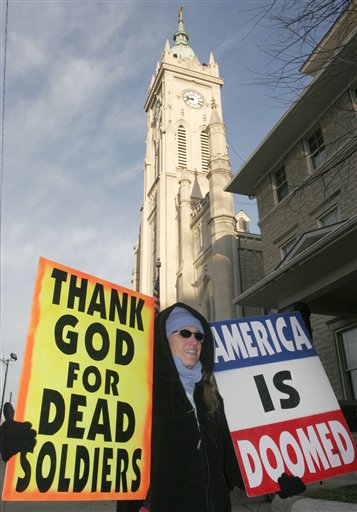Snyder v. Phelps (2011) –
Offensive? to Some but Still Free Speech 1st Amendment
In Snyder v. Phelps, 562 U.S. 443 (2011), the U.S. Supreme Court ruled 8-1 that the First Amendment prohibited the imposition of civil liability upon a church and its members who picketed the funeral of a slain Marine. The Court reasoned that the highly offensive expression was speech on a matter of public concern, uttered peacefully and lawfully on a public street.
Westboro Baptist Church picketed military funerals to protest American toleration of homosexuality
The Kansas-based Westboro Baptist Church and its founder Fred Phelps regularly picketed at military funerals to advance their views that God punished the United States for its toleration and promotion of homosexuality by killing the country’s soldiers.
Phelps, two of his daughters, and four of his grandchildren picketed at the funeral of slain Marine Matthew Snyder, killed in the line of duty in Iraq. The Phelps clan conducted themselves peacefully and pursuant to police orders. However, their signs included messages, such as “God Hates Fags,” “Thank God for IEDs,” and “America is Doomed.”
Family of slain Marine won $5 million against church founders
Albert Snyder, the father of Matthew, sued the Westboro Baptist Church, Phelps, and his daughters for defamation, publicity given to private life, intentional infliction of emotional distress, intrusion upon seclusion, and civil conspiracy.
A federal district court granted summary judgment to defamation and publicity given to private life. The other three claims proceeded to a jury, which awarded Snyder $2.9 million in compensatory damages and $8 million in punitive damages. The federal district court judge remitted the punitive damage award to $2.1 million for a total of $5 million.
Court overturned award, ruled church members have First Amendment right of speech

Phelps appealed to the Fourth U.S. Circuit Court of Appeals, which reversed on First Amendment grounds. The appeals court determined that the Phelps’ expression was speech on a matter of public concern.
Snyder appealed to the U.S. Supreme Court, which affirmed the appeals court. Writing for the majority, Chief Justice John G. Roberts, Jr. emphasized that the defendants’ speech touched on matters of public concern or importance. He also emphasized that the protestors conducted themselves peacefully on public streets pursuant to police directives.
Addressing the intentional infliction of emotional distress claim, Roberts focused on the requirement of outrageousness. He relied on the Court’s decision in Hustler Magazine, Inc. v. Falwell (1988) for the principle that outrageousness is a “highly malleable” standard that is too subjective when applied to speech on a matter of public concern.
Court noted that church members stayed ‘well away’ from funeral
Roberts next addressed the intrusion claim, a form of invasion of privacy. Snyder had argued that he was a captive audience to the offensive and repugnant messages of the defendants. However, Roberts noted that “Westboro stayed well away from the funeral” and that the captive audience doctrine generally applies only to protect the privacy rights of homeowners. He also rejected the civil conspiracy claim.
Roberts concluded with language that has become First Amendment lore:
“Speech is powerful. It can stir people to action, move them to tears of both joy and sorrow, and – as it did here – inflict great pain. On the facts before us, we cannot react to that pain by punishing the speaker. As a Nation we have chosen a different course – to protect even hurtful speech on public issues to ensure that we do not stifle public debate.”
Justice Stephen Breyer wrote a concurring opinion. He acknowledged that a state sometimes can regulate picketing on matters of public concern. However, he balanced the First Amendment values and state-protected interests to reach the same result.
Justice Samuel Alito filed a solitary dissent. “Our profound national commitment to free and open debate is not a license for the vicious verbal assault that occurred in this case,” he wrote.
David L. Hudson, Jr. is a law professor at Belmont who publishes widely on First Amendment topics. He is the author of a 12-lecture audio course on the First Amendment entitled Freedom of Speech: Understanding the First Amendment (Now You Know Media, 2018). He also is the author of many First Amendment books, including The First Amendment: Freedom of Speech (Thomson Reuters, 2012) and Freedom of Speech: Documents Decoded (ABC-CLIO, 2017). This article was originally published in 2017.
cited https://mtsu.edu/first-amendment/article/1474/snyder-v-phelps
Express Unpopular Views – Rule of Law
Snyder v. Phelps
Summary of a First Amendment Landmark Supreme Court case:
Snyder v. Phelps 131 S. Ct. 1207 (2011)(link is external)
Facts:
Fred Phelps and his followers at the Westboro Baptist Church believe that God punishes the United States for its tolerance of homosexuality, particularly within the military. To demonstrate their beliefs, Phelps and his followers often picket at military funerals.
Albert Snyder’s son, Lance Corporal Matthew Snyder, was killed in the line of duty in Iraq in 2006. Westboro picketed Matthew Snyder’s funeral displaying signs that stated, for instance, “God Hates the USA/Thank God for 9/11,” “Thank God for Dead Soldiers,” and “Don’t Pray for the USA.” The church notified local authorities in advance that they intended to picket the funeral, staged the picket on public land adjacent to a public street, and complied with all police instructions. Church members also sang hymns and recited Bible verses.
Although Albert Snyder could see the tops of the picket signs on the day of the funeral, he could not read what was written on them and it was not until he saw a news story about the funeral and the picketing that he became aware of the church’s message. Snyder sued Phelps and the church claiming, among other things, that their actions caused him severe emotional distress. In defense, Phelps argued that his speech (the picketing and the signs) was protected under the Free Speech Clause of the First Amendment to the Constitution.
Issue:
Whether Westboro’s signs and comments while picketing Matthew Snyder’s funeral related to matters of public concern and were, thus, entitled to greater protection under the Free Speech Clause of the First Amendment?
Ruling:
Yes.
Reasoning:
(Chief Justice Roberts) The Supreme Court’s holding turned largely on its determination that the church was speaking on “matters of public concern” as opposed to “matters of purely private significance.” The Court explained that “[s]peech deals with matters of public concern when it can ‘be fairly considered as relating to any matter of political, social, or other concern to the community’ or when it ‘is a subject of general interest and of value and concern to the public.'” Speech on public issues is entitled to special protection under the First Amendment because it serves the “the principle that debate on public issues should be uninhibited, robust, and wide-open.”
To determine whether the speech dealt with matters of public concern, the Court examined the “content, form, and context” of the speech. The court noted that none of these factors would determine the outcome of the case and that a court must evaluate all the circumstances of the speech, “including what was said, where it was said, and how it was said.”
Even though some of the picket signs arguably targeted only the Snyder family, most of them addressed issues regarding the moral conduct of the U.S., the fate of the U.S., and homosexuality in the military. As such, the “overall thrust and dominant theme” of the speech related to broader public issues. Furthermore, the church was picketing on public land adjacent to a public street. Finally, there was no pre-existing relationship between Westboro’s speech and Snyder that might suggest that the speech on public matters was intended to mask an attack on Snyder over a private matter. Therefore, the Court held that the Phelps and his followers were “speaking” on matters of public concern on public property and thus, were entitled to protection under the First Amendment.
Dissent:
(Alito, J.) Justice Alito argued that the national commitment to free and open debate is not a license for the vicious verbal assault that occurred in this case. He noted that “the First Amendment does not shield utterances that form ‘no essential part of any exposition of ideas, and are of such slight social value as a step to truth that any benefit that may be derived from them is clearly outweighed by the social interest in order and morality.'” Accordingly, he asserts that, in light of the grave injury inflicted by the statements in this case, the First Amendment should not interfere with recovery for tort damages. source

